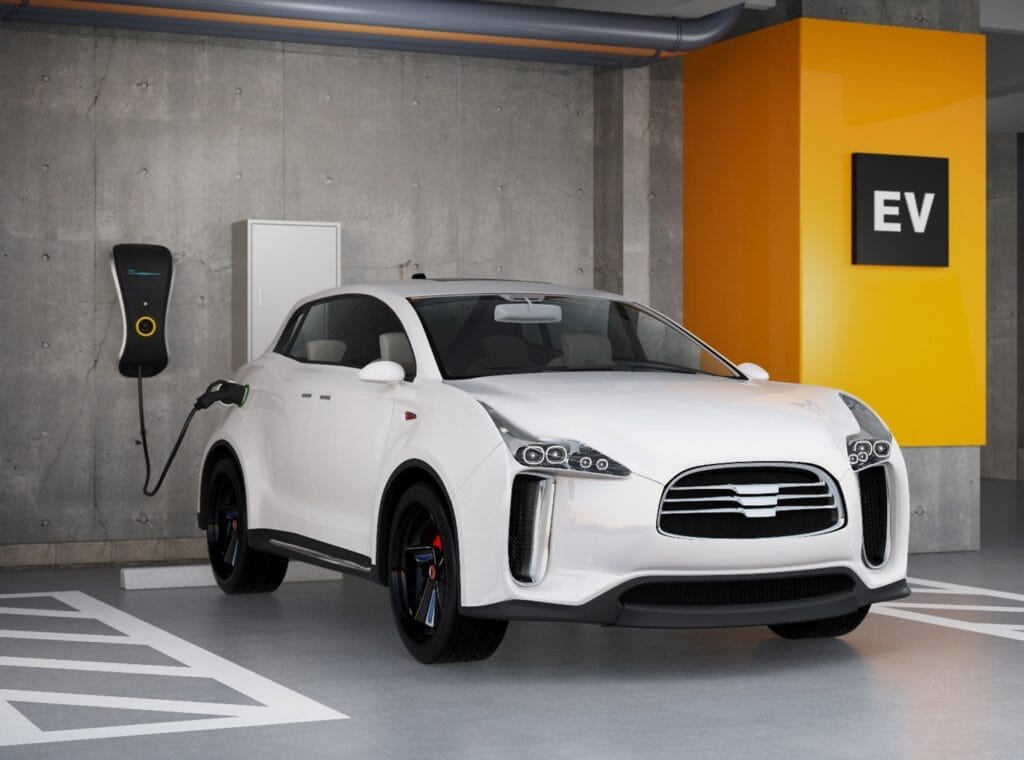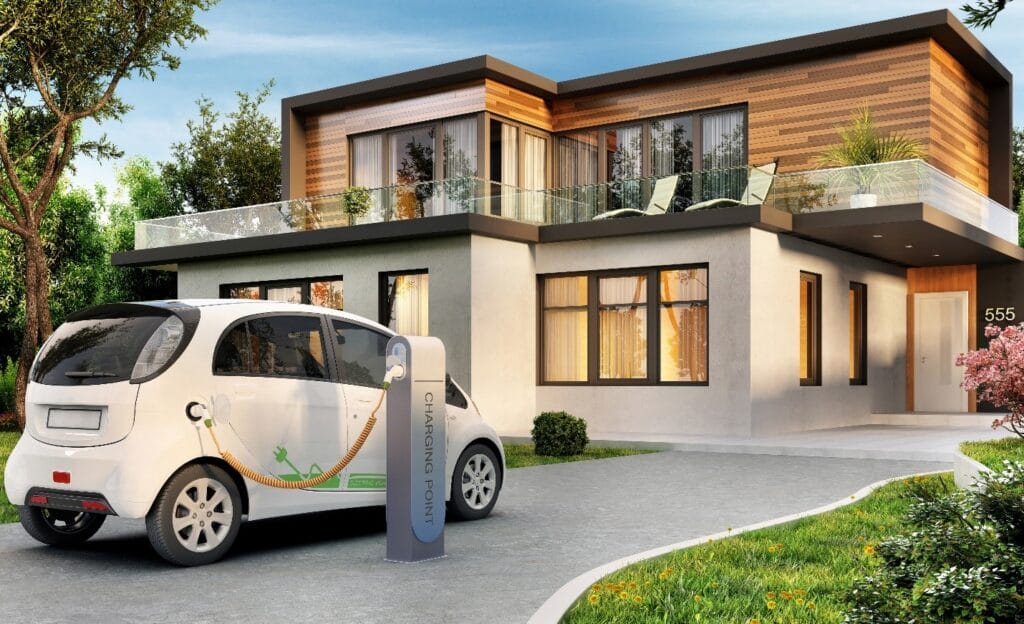The excitement over new vehicles combined with today’s technology is never-ending. Car shows and showrooms are filled with new and future models headed to market.
The electric vehicle (EV) is one innovation growing in popularity, especially in Illinois. Between 2022 and 2023 sales of electric vehicles grew by 60% with 94,000 EVs registered in the state.
Table of contents
- What is an electric vehicle
- Types of electric vehicles
- 4 reasons why Illinois has a vested interest in electric vehicles
- What is the Illinois EV Car Charging Act about?
- How new EV charging act impacts HOAs in Illinois
- HOA Communities in Illinois Evolve with Electric Vehicle Act
These EVs are purchased and driven by working class people, and many of whom live in planned HOA communities. This reality presents new challenges for HOAs whose rules and guiding documents do not provide accommodations for electric vehicles.
However, Illinois is planning for the future and expects HOAs to do the same. Let’s see what that entails, starting with a little more information about electric vehicles and what they need to operate.
What is an electric vehicle
An electric vehicle is any vehicle powered by an electric motor. The electric motor is powered by a rechargeable battery which uses electricity from any external source, like a house or a EV charging station.

Types of electric vehicles
There are a variety of electric vehicles, and below is a basic overview of the categories of electric vehicles.
| BEV – Battery Electric Vehicle | Completely electricNever uses gasoline Electric motor Electric battery No oil changesNo transmissions No exhaust systems |
| PHEV – Plug-in Hybrid Electric Vehicle | Electric powered motorGasoline to power combustion engineLarge battery pack Can run on fuel alone if no charging station available |
| HEV– Hybrid Electric Vehicles | Use both a combustion engine and electric motorCan not plug in an HEVOnboard battery is recharged by the engine and regenerative braking |
As you can see from the chart above, electric vehicles can use solely electric power or combined sources of power and include mechanical combinations, making car manufacturers competitive in the marketplace.
Now that you have an idea about electric vehicles, let’s find out why the state of Illinois has its attention focused on them.
4 reasons why Illinois has a vested interest in electric vehicles
The state of Illinois is strategically supporting the EV industry for a number of reasons; three of which are:
1. Alternative energy
Illinois is leaning into alternative energy solutions as part of its future planning. It has committed to adding 1,000 new fast-charging stations by the of 2024 across the state mostly at in public locations like shopping centers, hotels, truck stops and restaurants.
2. Playing catch up to consumer purchases
Alliance for Automotive Innovation ranked Illinois 49th out of 50 states with the least amount of EV charger access based on the ratio of electric vehicles to public chargers.
3. Millions of dollars up for grabs
There is $93 million dollars in grants provided by the federal National Electric Vehicle Infrastructure Formula Program that will be awarded to states installing charging stations in 2024. And $50 million of those funds will be awarded for installing fast EV charging stations throughout interstate highways.
4. Position itself as an EV hub
The state of Illinois is investing and receiving billions of dollars to bolster their clean energy goals. One of those goals is that there will be 1 million EV in the state by 2030, it currently has a little over 94,000 registered EV vehicles and it intends to be 100 percent clean energy by 2050.
These and other reasons have led the state to pass the EV Car Charging Act that will affect all communities, including HOAs.
Let’s find out what the Act entails.
What is the Illinois EV Car Charging Act about?
The Illinois EV Car Charging Act (765ILCS1085) allows for the installation and use of electric vehicle charging stations at both residential and business properties.
Specifically, it means new single-family homes and multi-unit residential buildings built and renovated after January 1, 2024 can have electric vehicle charging stations on the property as parking spaces.

For existing homes and communities, the Act also includes EV charging stations guidelines that still make it possible and easy for homeowners and renters to install charging stations at their residences.
Effectively, this new law makes it easier for people to operate their electric vehicles, with ease of access to charging the batteries.
As you can imagine, this new law will affect many different entities and organizations, and HOAs in Illinois being one of them, will have to accommodate this new state law.
How new EV charging act impacts HOAs in Illinois
If you are an HOA in Illinois either you are ahead of the plan, aware that this was the direction of the EV tide was moving, or you are trying to move quickly to research, learn and make sure your HOA’s guiding documents are compliant with state law.
Let’s take a look at some of the details that will help you better understand specific ways your HOA will be impacted.
HOAs must permit EV charging stations
The law allows both homeowners and renters in an HOA to install an EV charging station and HOAs must permit it under reasonable conditions, and as long as there is a parking space for the vehicle. In other words, an HOA can not prevent the installation of an EV charging station as long as it is installed where there is a parking space for that vehicle.
HOAs do not pay for the EV charging stations…unless they want to
HOAs are not obligated to pay for the installation of EV charging stations in the community. However, some HOAs may pay to have them installed in a common area and charge members a fee to use it or increase member fees for everyone.
HOAs must approve the installation of EV charging stations
Although, HOAs cannot prevent installations of EV charging stations, an HOA homeowner and/or resident must still get the HOA’s permission if they want to install one at their parking space. It’s possible to get permission by using an automated architectural change application process as used for other home renovations to capture all the details.
Update HOA policies to accommodate EV charging stations
Of course HOA guiding documents will need to be updated when developing EV charging station policies. There is much to consider such as:
- Will the HOA purchase the EV charging stations to be placed in shared areas or will the member purchase their own charging station or both?
- Clarifying all the requirements pertaining to the EV charging station such as type of charger, location, who is the installation contractor, the power station that will be accessed, type of payment for using the station.
- Usage fees either paid withing HOA fees or separately.
- Safety concerns around high voltage and water damage.
- Present and future needs as the EVs continue to increase in sales.
- Regular communication with residents about EV new developments and their impact on HOAs
- Understanding and complying with state law.
- Selecting and using licensed contractors for installation.
- Ensuring the HOA is insured as an additional insured verified with a certificate of insurance.
HOAs are not expected to understand all the implications of the EV industry, so reach out for legal assistance and experts who can help guide you.
HOA Communities in Illinois Evolve with Electric Vehicle Act
As technology, energy sources and vehicles evolve, homeowner associations will need to accommodate new innovations and consumers as a driving force. When looking for a home a homebuyer will sooner choose an HOA community that easily accommodates their electric vehicle over one that does not.
This coupled with the fact that HOAs in Illinois must comply with state laws regarding electric vehicle charging stations means that HOAs will be moving quickly to accommodate requests for electric vehicle charging stations from members who want them and/or to include EV charging stations in common areas of the community.
The state of Illinois is moving full steam ahead into the electric vehicle revolution with its goal of 1 million electric vehicles by the year 2030 and 100 percent clean energy by 2050, and modern HOAs will need to keep pace.
The post Illinois’ Electric Vehicle Charging Act and Its Role in Modern HOAs appeared first on Condo Control.
